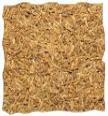Cumin

Cumin
Botanical Name
Cuminum cyminum L.Family
ApiaceaeCommercial Part
FruitDescription
Cumin is the dried, white fruit with greyish brown colour of a small slender annual herb. The surface of the fruit has 5 primary ridges, alternatively has 4 less distinct secondary ridges bearing numerous short hairs. The plant is 15 to 50 cm high. The aromatic seed like fruit is elongated, ovoid, 3 to 6 mm long, slightly bitter and has a warm flavour. The flowers are white or rose coloured in small umbels.
Origin and Distribution
Cumin is the dried, white fruit with greyish brown colour of a small slender annual herb. The surface of the fruit has 5 primary ridges, alternatively has 4 less distinct secondary ridges bearing numerous short hairs. The plant is 15 to 50 cm high. The aromatic seed like fruit is elongated, ovoid, 3 to 6 mm long, slightly bitter and has a warm flavour. The flowers are white or rose coloured in small umbels.
Uses
Cumin seed have an aromatic odour and bitter taste. It is used as a condiment, and is an ingredient in curry powders, seasonings of breads, cakes and cheese. It is employed in native dishes of Central and South America. In medicine, it is used as a stimulant, carminative, stomachic and astringent. Cumin seed oil is used in perfumery and for flavouring liqueurs and cordials.
Indian Name of Spices
Hindi : Jira, Jeera, Zira or Safaid jeera Or Zeera Bengali : Safaid jira or Zeera Gujarati : Jiru or Jeeru Kannada : Jeeriege Kashmiri : Zyur Malayalam : Jeerakam Marathi : Jeregire Oriya : Jira, Jeera Sindhi : Zero Sanskrit : Jiraka, Jira Tamil : Ziragum or Jeeragam Telugu : Jidakara, Jikaka
Foreign Name of Spices
Spanish : Comino French : Cumin German : Romischer Kummel Swedish : Spiskummin Arabic : Kammun Dutch : Komijn Italian : Comino Portuguese : Cominho Russian : Kmin Chinese : Machin







